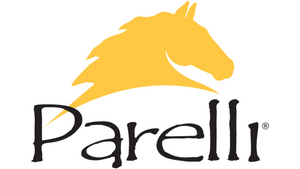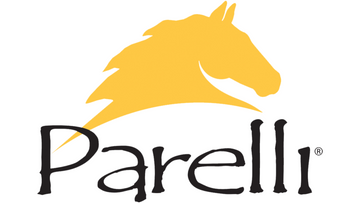Ulcer Symptoms in Horses: How to Spot the Warning Signs Early
por Parelli Professionals en Oct 09, 2024

Gastric ulcers are a condition that affects many animals and even humans. They are erosions in the stomach lining usually caused by increased gastric acid. Gastric acid is naturally occurring in horses' digestive tracts. However, horses commonly suffer from ulcers because their stomachs constantly produce this acid.
Squamous ulcers affect the upper part of the stomach. They are usually caused by stress, high-grain diets, intense exercise, and intermittent feeding. The glandular ulcer, which affects the lower part of the stomach, is caused by a reduction of the natural mucus in the stomach.
Gastric ulcers are a serious health issue. If left untreated, the ulcer can increase in size, ultimately causing a perforation of the stomach lining. Horse owners need to be active in their horses' health. If you see any concerning symptoms, reach out to your veterinarian immediately.
What causes gastric ulcers?
Gastric ulcers develop because of an imbalance (increase or decrease) of the naturally occurring stomach acid in your horse's stomach. There are many reasons the level of acid changes. Stress, diet, feeding schedule, and even medications can cause serious issues to the stomach lining.
Stress is the leading cause of gastric ulcers. A horse that frequently experiences stressful situations like competition, transport, and even intense training can develop an overproduction of stomach acid.
If a horse is fed a diet low in roughage, his stomach can be affected. This diet leads to too much starch in the body, distorting the natural balance of stomach acid. A poorly planned feeding schedule can also cause issues in your horse's stomach.
Some medications, like non-steroidal anti-inflammatory drugs (NSAIDs), damage the stomach lining, resulting in ulcers. Additionally, corticosteroids increase the production of stomach acid, increasing the risk of ulcers.
Common signs
The clinical signs of gastric ulcers are subtle at first but can quickly become severe and obvious.
Poor Appetite
Ulcers are uncomfortable, mainly when a horse eats. Adult horses may suddenly develop poor appetites because of the ulcer. They may refuse to eat altogether. This loss of appetite can lead to other symptoms on our list.
Weight Loss
Horses with ulcers lose their appetites. Therefore, with decreased food consumption, the horse will lose weight.
Poor Coat Condition
Ulcers cause discomfort and changes in appetite. Without proper nutrition, the coat suffers. In some cases, the horse will begin to shed excessively or develop bald patches.
Poor Body Condition
Just like the coat, the body also suffers. Without the proper balance and decreased nutrient absorption, you’ll notice a reduction in muscle mass, lethargy, dull eyes, and poor hoof condition.
Chronic Diarrhea
Ulcers can cause chronic diarrhea, which is a very concerning symptom because it can quickly lead to dehydration and nutrient loss. Several medications can help reduce chronic diarrhea from ulcers. Contact your veterinarian to create a proper treatment plan for your horse.
Colic
The equine stomach reacts poorly to ulcers. Colic is a condition in which your horse shows signs of pain, particularly in the abdomen, and restlessness. Many cases of colic can turn severe quickly if untreated. Most colics will present with an elevated heart rate, lethargy, rolling, biting, or kicking at their sides. Some horses will lay prone. Sand colic horses will generally lay down on their sternum for extended periods.
Behavioral Changes
When a horse is in pain, his behavior will change. He will be more irritable, less disciplined, and more aggressive. In some cases, your horse may also show signs of depression.
Sensitivity in the Girth Area
Of course, the stomach area is where your horse will be the most sensitive. You may first notice your horse's discomfort when tightening his girth. The girth area is very close to the stomach. With stomach ulcers, your horse will resist the tightening of the girth.
Stretching
It is normal for your horse to stretch throughout the day. However, if you notice excessive stretching right after they eat, it might be an issue. Stretching after eating can alleviate stomach pain.
Cribbing
Cribbing is an addictive and compulsive behavior in which a horse latches his teeth onto a hard surface and sucks in air. Cribbing can cause a lot of other health issues as well.
Teeth Grinding
Teeth grinding, like cribbing, is a compulsive behavior that horses with ulcers can develop. Horses can sometimes develop this habit because of the pain and discomfort.
Poor Performance
If your horse is a competitor, you will see a drop in performance with ulcers. The pain and discomfort caused by ulcers can really affect a horse. Moreover, the horse will lose nutrients as its appetite decreases due to the ulcers.
Diagnosing gastric ulcers
Often, gastric ulcers can begin as a discomfort. Seeing this discomfort in your horse may be difficult, especially because he cannot tell you. Recurrent colic is a sign that something is bothering your horse.
After assessing any obvious symptoms, your veterinarian may recommend an endoscopy. An endoscopy is the only way to truly diagnose ulcers. During this procedure, a veterinarian feeds a long camera through your horse's digestive tract to view the inside of the stomach. With the camera, she can get a good idea of the health of the stomach lining. It is important to note where the ulcer is and its severity.
For minor cases, an endoscopy may not be advised. In this case, a veterinarian will use the symptoms and her judgment to make a diagnosis. Treatment will be prescribed. If the horse responds well to the treatment, it is easy to confirm the ulcers.
Treatment of gastric ulcers
To treat gastric ulcers, you must know their severity and cause. If diet or feeding schedule are the cause, you can make adjustments. Design a diet that is balanced in fiber, roughage, and carbohydrates. Additionally, create a feeding schedule that promotes good digestive health.
For more severe cases, medication is needed. There are various types of medications that you can give your horse. Omeprazole helps reduce the production of gastric acid in the stomach. On the other hand, sucralfate is a medication that coats the stomach to protect it from gastric acid.
If stress is the primary cause, look to reduce these events or the stress in the situation.
Healthy Horses – mentally, emotionally, and physically
This article has shed some light on ulcer symptoms and how to be monitoring your horse to ensure he’s staying healthy and physically fit.
Remember, here at Parelli Natural Horsemanship, we want to balance our horses in all areas – mentally, emotionally and physically. This is where a solid training program comes in alongside quality medical care and feeding routines. Level 1 of the Parelli Program is where this all begins. You learn how to build a language with your horse so that you can communicate and develop your skills first on the ground and then riding. The 7 Games are a balance of bonding and yielding exercises that are good for any horse and are a key component to building a healthy relationship with your horse. Click here to learn more and get started having fun and growing a solid, healthy relationship with your horse today, one that will last a lifetime!







